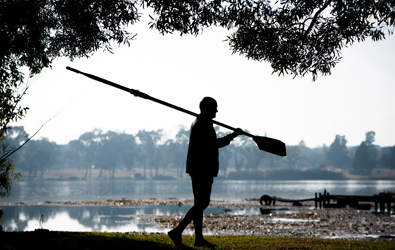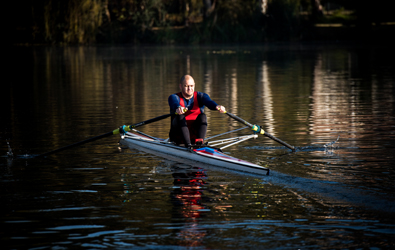
Living with Asthma
Richard Rawbone is a business integration manager, keen sportsman, husband and father of two young boys. He has learned not to allow his chronic condition to prevent him from attaining his goals.
‘As children, my sister and I played with our cousins on our grandparents’ smallholding in Walkerville, Gauteng. During winter, when there were veld fires, I was never allowed to go with the other children to help put out the flames or build fire breaks. And when the cows got out of their enclosures, I wasn’t allowed to help round them up. This is because I’d suffer particularly bad asthma attacks, triggered by smoke, grass, exertion and animal dander, which would see me being rushed to casualty. I always felt left out during those times because I couldn’t be as useful as the others and couldn’t be part of the excitement.
I was diagnosed with asthma at the age of five after being hospitalised to treat an attack. At that point my family didn’t really understand the condition and consequently, I was very sheltered by my mom. Doctors explained they needed to find what triggered my attacks and that I’d then have to minimise contact with these triggers. Although I was told I shouldn’t let asthma stop me from doing what I wanted to do, I was also not to ignore it because it could get worse.
To explain what an asthma attack feels like, imagine trying to breathe out through a wet face cloth. Breathing in is okay, but breathing out is close to impossible. Or imagine taking a deep breath for five seconds, then breathing out for 20 seconds. Those last 15 to 20 seconds of the exhale are absolute torture for an asthma sufferer. For me, an added problem is the panic, which makes me inhale more air which I then can’t push the air out of my lungs. Panic makes an attack that much worse.
At primary school, I wanted to play cricket, soccer and do athletics but I always felt I was the weak link in the teams I joined. I guess I developed an inferiority complex because I couldn’t breathe properly. Eventually I started taking my pump on the field with me and played whatever sport I was doing with it in my pocket. Sometimes I’d give it to my club soccer and/or rugby coach to hold while I was playing.
Often I would play until I couldn’t catch my breath and then would have to be pulled off the field to be treated. I also remember nights where my mom would have to sit with me until the attack I was having passed. In fact, until my early-twenties, I would need to go to casualty at least twice a year to be treated for my condition.
Although I played cricket and rugby throughout school, I soon found rowing was far more enjoyable and switched sporting codes. With rowing, I was always in the A team and won numerous races. I even made the provincial team and the training team for SA Junior Squad. Rowing was the first sport I was actually good at. I think that was because of the breathing techniques we were taught (breathe in during the recovery of the stroke, exhale at the finish of the stroke). This forced me to learn how to push that oxygen out.
However, I still had the ritual of taking my pump before the race and praying I didn’t get hit with an attack. And because of my ‘inferiority complex’ with sports and my peers, I always felt I was behind the curve. I felt I constantly needed to put in that extra work to be on par with my team mates. It wasn’t uncommon for me to be on the rowing machine during the off season for up to an hour three times a week. Or to take part in extra rugby fitness training and long-distance athletics training to supplement my rowing training.
After school, I continued playing club rugby but was more focused on my rowing at university. But I always had the fear of an asthma attack and was scared to push myself to the very ends of what I was capable of. This fear limited and prevented me from taking the next step into the A crews at university – I always thought I couldn’t do it because of my asthma. In addition, during one SA Senior Championships race, I suffered an asthma attack and had to sit in the ambulance with oxygen, knowing I let my friend and doubles partner down for a race we could have won. That was possibly the worst moment I can remember when thinking about asthma.
I eventually got a rowing coach who helped me push past my fear. A former Olympian, Ross Hawkins started coaching my crew in 2006. During those sessions he would refuse to hold my pump for me and made me do more laps if he saw me taking a puff from the pump. He was of the opinion that it was a crutch and I was using it as an excuse to not push as hard as I could.
He was right. It was – and because of my past I had built up habits of relying on my asthma pump to breathe. Breaking those habits was hard to overcome. He would tell me: “if it happens, it happens and we will deal with it. If it doesn’t, push harder.” That switch has helped me deal with the fear of an attack and deal with it when it happens.



Realising that I don’t need to be ruled by the fear of the attack has helped me achieve a lot more than I thought I was able to. I have completed five 94.7-kilometre cycle races, a few park runs, thousands of kilometres in a single rowing boat and many more on the rowing machine. There was even a stage where I could run 5km in 20 minutes.
For as long as I can remember I have been used a Ventolin pump for immediate relief when an attack happens. In the mornings and evenings, I take Symbicort, which is a broncho-dilator and preventative medicine. Being vigilant about taking my medication – and telling myself that I am able to deal with an attack if it happens rather than fearing it – has helped me gain control of my condition.
I am on the Bankmed Comprehensive Plan. They check up telephonically to ask how things have been and if I’ve had any attacks recently. They also confirm if I’m taking my medication correctly and when last I saw the doctor regarding the condition.
My advice to other sufferers is: don’t let asthma define you. Use the medication as prescribed and don’t let the attack go too far. Doctors have got treatment down to a fine art and if medication is taken as intended, you or your child can be as active as you/they want to be. In addition, if you feel an attack is getting the better of you, there is no shame in asking for help, from a loved one or hospital staff.